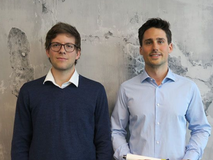UniSieve secures USD 5.5 million to fight carbon emissions
26.04.2023
The cleantech startup announced the closing of an oversubscribed seed funding round today. The Venture Kick alum is developing high-precision membrane solution to decarbonize heavily emitting industries by drastically reducing heating and cooling in chemicals and improves the carbon capture.
 UniSieve's founders, Dr. Elia Schneider and Dr. Samuel Hess
|
Even though heavy industries such as chemical or energy companies are some of the biggest sources of carbon emissions, they are broadly committed to the net-zero goals of the Paris Agreement. Today, 10-15% of the world's energy consumption is for separation and purification, which is a key process step in most industries but also requires highly energy-intensive thermal processes.
In an effort to improve the global commitment to this target, the Swiss cleantech company UniSieve has developed membrane-based separation solutions that can separate chemicals, energy carriers, or CO2 from flue gas based on size exclusion, without relying on heating or cooling. The startup was founded in 2018 by ETH alumni Samuel Hess and Elia Schneider, who discovered the means to manufacture and integrate porous crystals (zeolitic materials) into polymeric membranes.
The startup announced that it raised USD 5.5 million in a seed funding round, which it will invest in expanding production capacities. This oversubscribed funding round saw participation from a venture capital consortium including the Amadeus APEX Technology Fund, Wingman Ventures, Ciech Ventures, and Zürcher Kantonalbank.
"Our solution is addressing a major emissions cause and its potential for energy and emission reduction is significant for our planet," said Samuel Hess, co-founder and CEO of UniSieve commented. "In essence, we say stop boiling and start sieving to end energy-intensive distillation. The concept of sieving works as simple as a coffee filter holding back the coffee powder from an espresso. However, it gets a little tricky when separating chemicals that vary in size by a fraction of an angstrom only (1 angstrom equals one-tenth of a nanometer). To do so, the sieve must be extremely narrow and precise. The UniSieve membrane is a structure made of a highly ordered network of porous crystals that generate in a repeating pattern, much like ancient Roman mosaics. The concept of combining molecular sieves with a support layer to create the perfect membrane has been out there for decades but never made it into broad, commercially applicable membranes. When creating the membrane platform technology, the UniSieve Team focussed on economic scalability, the most frequent reason that has prevented other approaches from succeeding."
Pre-seed funding from Wingman Ventures and several prestigious grants from the European Union, the Swiss government, and private foundations allowed the startup to prove the hypothesis of their scalable and affordable high-performing membranes. "We have run pilot testing with industry leaders which have demonstrated that the separation solution works," Hess added. "Today, we have several contracts signed and under negotiation to pilot our membranes in a variety of applications."
In 2018, UniSieve won the third stage of the Venture Kick program and was awarded CHF 130,000 to develop its solution.


